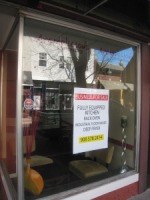The $49-million municipal budget anticipates almost $1 million of revenue from various PILOT (Payment In Lieu of Taxes) agreements, including the first from one of the Park Square properties.
The total $961,000 in PILOT revenue is up from the $783,000 in the 2011 budget and breaks down as follows:
* Lower Essex St – Denholz Management (Rahway Plaza Apartments) – $366,000
* Landmark – $150,000
* Parking Authority (River Place) — $170,000
* Rosegate — $25,000
* Senior citizen housing — $250,000
Landmark, which broke ground on the Irving Street side of Park Square (2 Park Square) in 2006, appealed its assessment in Tax Court, getting it reduced from $6.05 million to $4.077 million.
The Main Street side (1 Park Square) is assessed at $8.965 million.
 The PILOT agreement had the developer paying taxes on the assessed value of the parcels as they previously existed. Landmark will begin paying 20 percent of its assessment this year, which will rise 20 percent each year until it reaches 100 percent (which would be 2016).
The PILOT agreement had the developer paying taxes on the assessed value of the parcels as they previously existed. Landmark will begin paying 20 percent of its assessment this year, which will rise 20 percent each year until it reaches 100 percent (which would be 2016).
River Place was constructed on property owned by the Parking Authority, which receives an annual payment from the development’s owner and splits it roughly in half with the city.
The city budget also anticipates $660,000 in revenue from red light camera fines. About $1 million was realized in the Transitional Year budget, which covered the six months of July-December 2011.
The amount to be raised by taxes in the budget is $33.455 million. The proposed municipal tax rate for 2012 is 2.287 (per $100 of assessed value), so the average assessed home ($133,000) would see municipal taxes of $3,042, compared with $3,046 estimated last year. (Remember, municipal taxes make up only a portion of your overall property tax bill; the others being schools and county). Presented to City Council by the administration in February, the municipal budget will be up for a public hearing and vote at the March 12 meeting.
Like this:
Like Loading...




